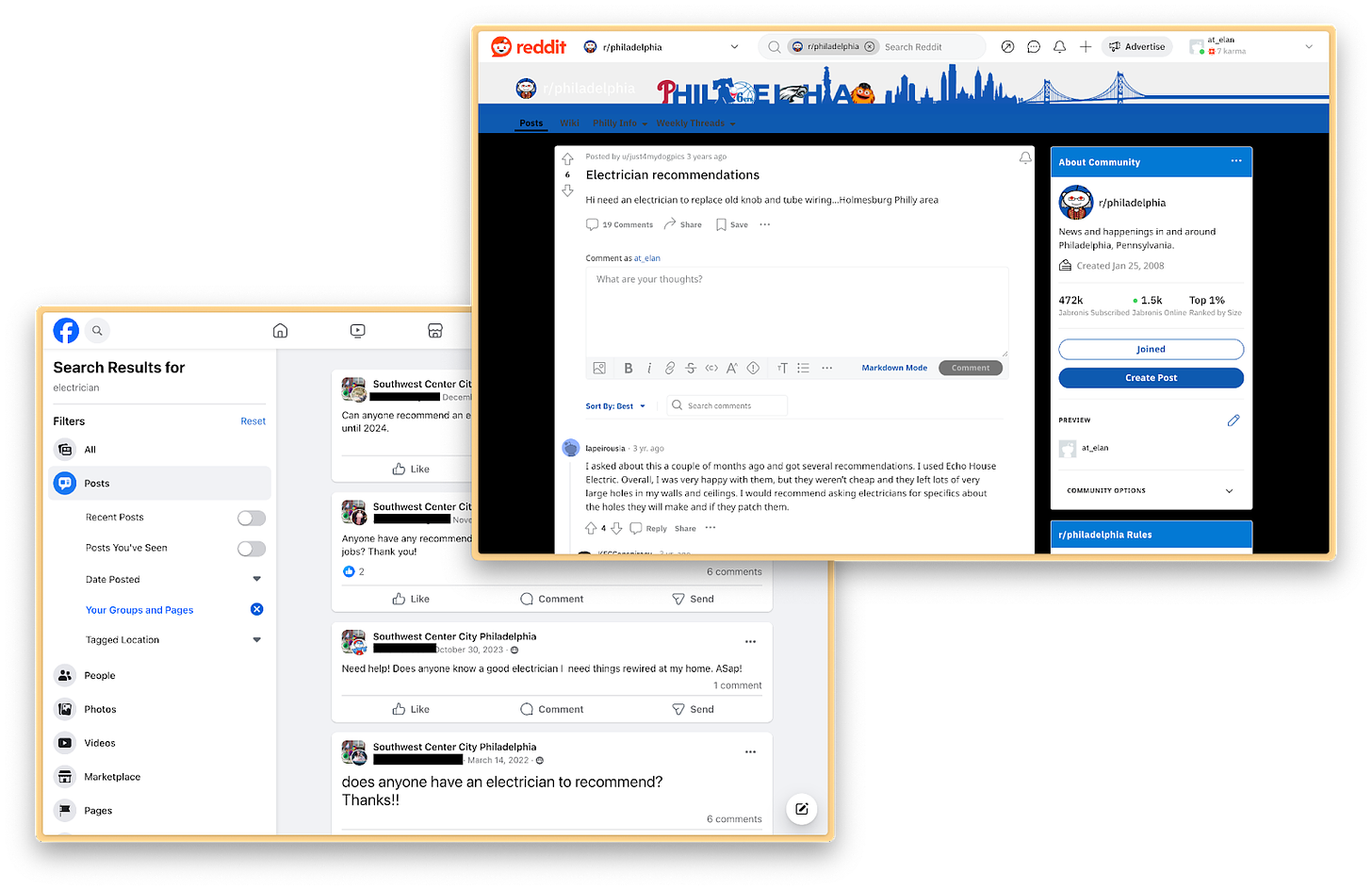One Thing is a newsletter about authenticity in all its forms. You may have noticed that Google Search is not quite as authentic as it used to be. Here, we explore some alternatives to mainstream search engines.
Elan Ullendorff: Imagine for a moment that Google Search is seized by a benevolent government. Under its new management, it has no profit motives. Its only directive is to help people find what they are looking for.
By the most basic laws of Cory Doctorow’s “enshittification,” in which platforms start good and then slowly degrade in quality, squeezing more value out of their users in order to benefit shareholders, the nationalization of Google Search would free it to be good again. But that ignores a second vector of deterioration: its users.
Here’s how a well-intentioned search engine decays: First, a novel algorithm is developed. It’s effective at helping people find what they are looking for, so they begin to rely on it. Then, the owners of the websites that are being found notice the search engine sending them traffic. They investigate or otherwise toy with the algorithm to see if they can appear higher in the rankings. Those who are best at this gain power, influence, or money.
Then, a cottage industry develops to help websites compete. The search engines adjust their algorithms to penalize bad actors that game the algorithm. Those bad actors become even more sophisticated. They scale their efforts, whether through automation or cheap labor. Finally, in order to be seen at all, good actors bend over backwards to cater to the algorithms, too. Participate or perish. Authenticity becomes not only silenced, but perverted.
The resulting product, despite its good intentions, is a search engine that surfaces websites that were written to be optimized for a search engine. You are not the audience; the algorithm is.
We don’t need a better large search engine. Instead, we need to cultivate what I would call “folk search algorithms,” a set of tools and practices that, whether by chance or design, are not influential enough to move markets:
Use small, alternative search engines. You be familiar with some less popular search engines, but the reality is that the vast majority, including DuckDuckGo, Yahoo, and AOL, are built on top of the webpage index of the big three search engines—Google, Bing, and Yandex—which themselves all have very similar logic for ranking webpages. So even many of the non-Googles are susceptible to secondhand enshittification. But there are some niche efforts to reimagine what searching can be. One of my favorites is Marginalia, a search engine created by a Swedish software developer that surfaces non-commercial websites. Another is an AI search engine called Exa. If a general purpose LLM works by predicting what text will come next, Exa works by predicting what links might follow your search query. (If you’re curious, I maintain a collection of other alt search engines here).
If I ask Google about the concept of “folk,” the first five results are all search engine-optimized dictionary websites. If I ask Marginalia or Exa, I am presented with a rich tapestry of rabbit holes to descend into (folk horror, folk interfaces, folk metal, folk tales) from a variety of sources (libraries, forums, artist journals, personal catalogs, niche newsletters, faculty pages, and academic articles).
Search with something other than a search engine. Sites like Reddit, Facebook Groups, Discord, and TikTok may technically have search functionality, but search is not their primary purpose. As such, the content maximizers focus their attention elsewhere, and search can still yield helpful results.
Use Google unconventionally. Long ago there used to be a stronger culture of sharing “Google hacks,” tricks for using advanced search operators to bend Google to your will. As Google search has gotten “better” at interpreting our intentions, this exchange of tips has quieted. But searching in ways that are, if not surprising, at least unconventional, can help evade the tactics of SEO specialists. Filtering my search for chana masala recipes by “.edu” domains, for example, may not make much intuitive sense, but does have the accidental effect of returning recipes that were not optimized within an inch of their life.
The email that I receive from Substack whenever somebody signs up for my newsletter contains a referral source. And while I love and appreciate even those who find my work through Twitter, Google, or Facebook, it hits different when the reader came from an are.na channel called “words continuous reframing,” the blog of a French essayist, a discussion on a British comedy forum, or the personal website of a microbiologist phd candidate with “archival tendencies,”
These to me are the closest corollary to “someone mentioned your project while we were engaged in deep discussion” or “I found a piece you wrote in the footnote of a book that I admire.” In other words, it took effort for us to find each other. And much like an inefficient light bulb gives off heat, folk search algorithms have the byproduct of context.
In the end, maybe that’s the only definition of authenticity that doesn’t fall apart under close inspection: not a state of being, but a relational action, an interest in doing the hard work not just to find but to truly search, for each other, around each other, within each other.
Elan Ullendorff is a designer, writer, and educator based in Philadelphia. He publishes Escape the Algorithm, a newsletter about taking control of our attention and finding a more human side of the internet.
From Our Readers:
This week’s previous newsletter about tote bags and belonging inspired some thoughts about what else signals belonging. Ginny Branch argued that baseball caps as the swag successor to totes, which I totally agree with — also it’s more fun to collect hats than totes. Kev from Objet cited Supreme hats and Thrasher t-shirts as symbols that were once specific but now have become cliche, too universal to be effective. And FOOT Mia recommended the Faccia Brutto tote, which you should pick up along with some Brooklyn-made aperitifs.
Sarah Hromack, of Soft Labor, wrote this dispatch on Issey Miyake clothes as signals to a tribe:
"Wearing Issey is like wearing your pajamas every day," I say when I receive a compliment. "It's so easy." The Pleats Please line has become popular with Dimes Square types, spotted running around the city paring their pants with any variety of oversized white sneakers, for example. I learned how to style Issey Miyake's clothing from a seventy-six-year-old White man from Vermont and an eighty-one-year-old Japanese woman from Osaka; they met in Tokyo when the latter booked the former to walk Miyake's runway. I mention this because I believe there is a certain distinction in how older folks carry the look. They'd never do the sneakers, age be damned. I can't count the number of times I've locked eyes with another Issey wearer — usually when we're both donning the crazier stuff — in a silent, knowing salute. Issey died in 2022, but his tribe carries on.





This was lovely, and coincidentally I discovered it via Kev's Sublime library: https://sublime.app/kev
When it comes to search I've always believed the opposite of a good idea is also a good idea. Google enabled scale and speed: every page on the web returned in an instant. But scale is at odds with another fundamental human need: relevance.
At Sublime, we're striving for that feeling of resonance that you can only get from farm-to-table organic search results, handmade with 100% certified human creativity.